At 2021 Convocation, Drexel Looks Both Forward and Inward
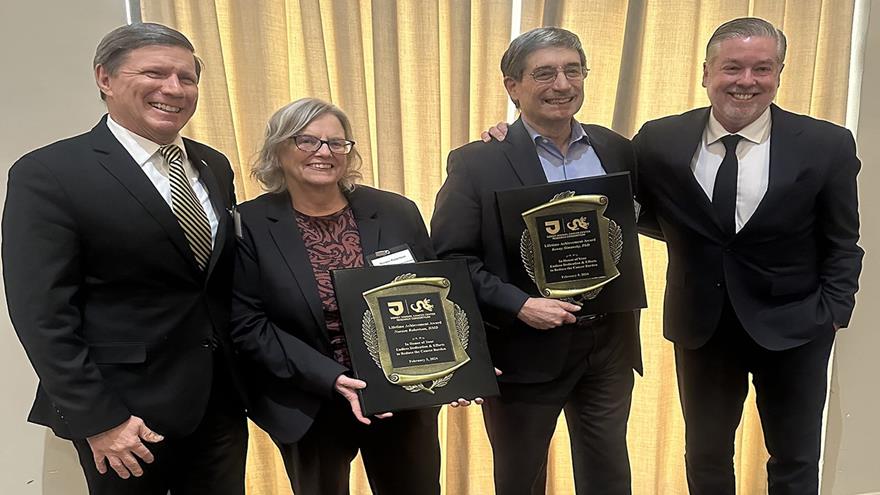
- Bolstered by Research Consortium with Drexel, Jefferson’s Sidney Kimmel Cancer Center Earns NCI Comprehensive Cancer Center Designation
- Alyssa Kemp Named as 2024 Truman Scholar
- Faculty Highlights: Recent Awards and Grants
- Ribbon-Cutting Ceremony Marks Official Unveiling of Drexel Station at 30th Street
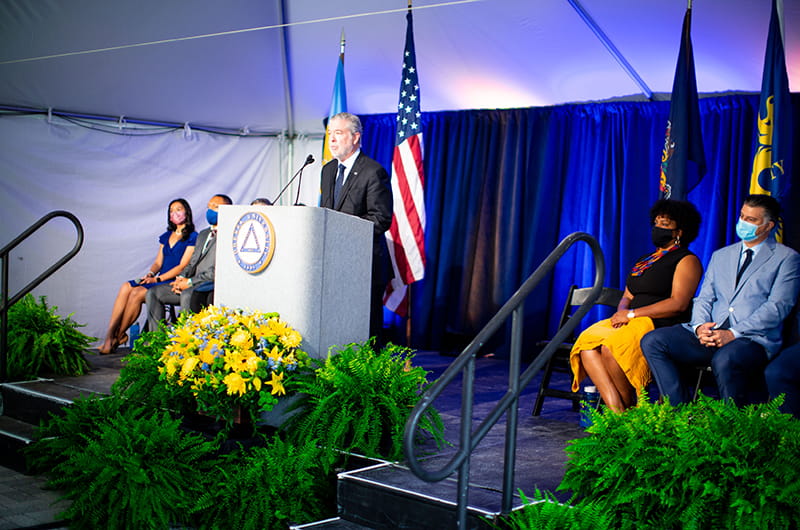
This year’s Convocation ceremony at Drexel University was a clear sign that the University community has resumed its campus life and is, as always, looking toward the future. It was also a sign that the University is doing so without forgetting the lessons, challenges and memories of the past year spent away from each other.
The annual event kicked off the school year with a reminder of the ways in which the University is responding to today’s societal problems and what work remains to be done, as well as how much its faculty, students and professional staff members have accomplished during extraordinarily difficult circumstances. Held Oct. 6, Convocation was hosted both in-person and virtually, with the event taking place in the Korman Quad and livestreamed for Dragons watching online. A video of the event is posted on the Office of the Provost’s website.
A mix of University leaders, faculty and student representatives took to the podium to address their fellow Dragons and share messages of hope, inspiration and the need to be conscientious and contributing members of society.
“If we are going to accomplish the greatest possible good for society, then each of us — as faculty members, students, professional staff, trustees and members of this community — must strive to become outstanding innovators,” said Drexel President John Fry in his speech.
Fry outlined three “essential principles” Drexel Dragons can follow to become those “outstanding innovators:” embrace collaboration and teamwork; recognize and respond to failure; and the third is to cultivate diversity and inclusion to create an environment even more welcoming to people and ideas.
“As we relearn how to live and work together, embracing these principles will help us to flourish together…. If we come together to do all these things, we will keep growing into a much better and more innovative Drexel that accomplishes even greater things for the world. And, hopefully, we’ll have some fun along the way,” said Fry.
A willingness to move forward while learning from the past (especially the past two years with pivotal insight into racial injustice and social inequity), rather than rush to resume a pre-pandemic life, was a key point brought up several times during Convocation. The overarching need to leverage Drexel’s resources and reputation for the greater good was referenced during many of the speeches as well.
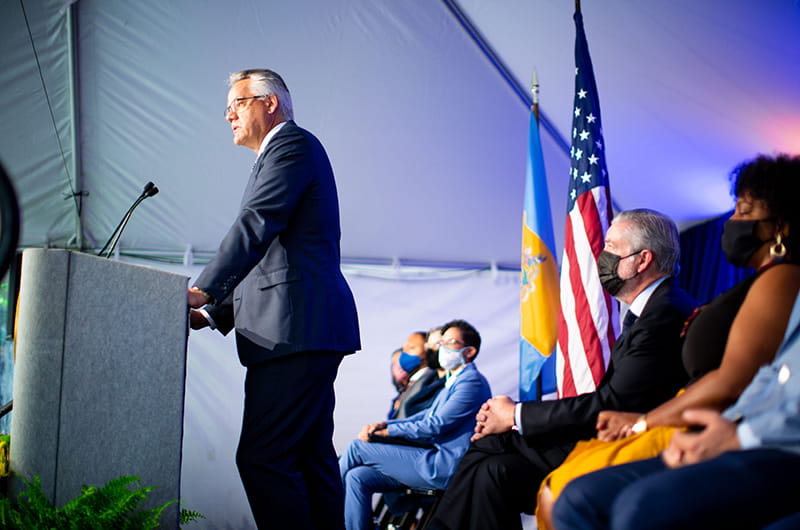
“As a university, we have an important role to play,” said Executive Vice President and Nina Henderson Provost Paul E. Jensen, PhD. “We are a place of civil discourse for asking questions and seeking solutions, but we are not just a university. We are Drexel University. We are built on a history of inclusion and partnership, on technological firsts, and on an entrepreneurial spirit and work ethic that drives us to dig in and do the hard work that needs to be done. But, we can’t rest on reputation alone. We have work to do to remain the University that we’re known to be, and to become more. This will be our focus on the academic side of the University: coming together to build the systems and infrastructure needed to adapt more rapidly, to drive innovation, incentivize partnership, and to better support our students, faculty, staff, alumni and partners.”
The three keynote speakers were leaders, as Jensen noted, who are “driving innovation and progress across campus and the world.”
“Each brings unique insight into the challenges we face and what it will take for Drexel to lead the change that is needed,” said Jensen. “And each is a true collaborator at heart, welcoming colleagues, students, partners and the community to join in the effort.”
Those speakers were:
- Sharelle Barber, ScD, assistant professor in the Department of Epidemiology and Biostatistics in the Dornsife School of Public Health and inaugural director of Drexel’s The Ubuntu Center on Racism, Global Movements and Population Health Equity.
- Genevieve Dion, professor in the Design Department in the Westphal College of Media Arts & Design and director of Drexel’s Center for Functional Fabrics.
- Franco Montalto, PhD, professor in the Department of Civil, Architectural and Environmental Engineering in the College of Engineering.
Barber, a social epidemiologist, described 2020 and 2021 as an important time in history when pervasive and persistent health inequalities have been exacerbated not just through the pandemic, but through social violence, climate change and racism. Now is also the time, Barber said, to address those forms of oppression and advance health equity and anti-racism by partnering with a wide and diverse range of experts and execute anti-racism principles and scholarship both on and off campus.
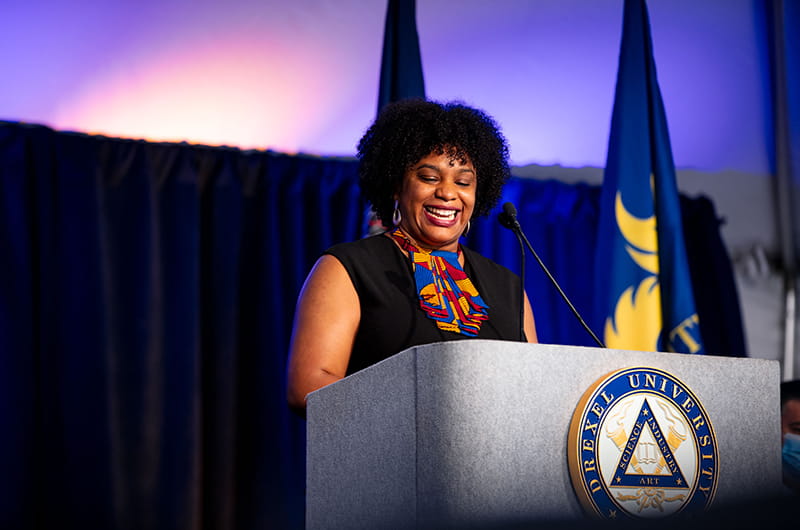
“The questions before all of us as we, as individuals and as a University, contemplate and reflect on what this moment means are not really technical ones. In fact, the technical ones may prove to be the easiest ones to answer,” said Barber. “The real questions of this moment are deep ones that must be answered with both our heads and our hearts. The issues are complex, interlocking and embedded within the brick and mortar and social fabric of our city, our nation, and our world. The solutions, therefore, cannot be mere Band-Aids on the gashing wounds of entrenched inequities. They must be bold and audacious and rooted in a deep sense of the collective and shared responsibility to rights the wrongs of the past.”
Drexel’s new The Ubuntu Center on Racism, Global Movements and Population Health Equity is one way in which the University is committed to use its resources and shared expertise to work with and for the community. Launched last academic year and opening this fall, the Center is driven by core values and a human-centered approach to live up to its name. “Ubuntu” is a South African principle meaning “I am because we are” and representing both “a way of being and a call to action,” Barber said; she learned it from and was inspired by Marielle Franco, “a queer Afro-Brazilian scholar, human rights activists and local politician who was brutally assassinated at the age of 38 in March 2018 for speaking truth to power.”
“The moment demands nothing less of us. In fact, our shared humanity requires it. We owe it to the ancestors that struggled before us, and the future generations who will come along after us,” said Barber.
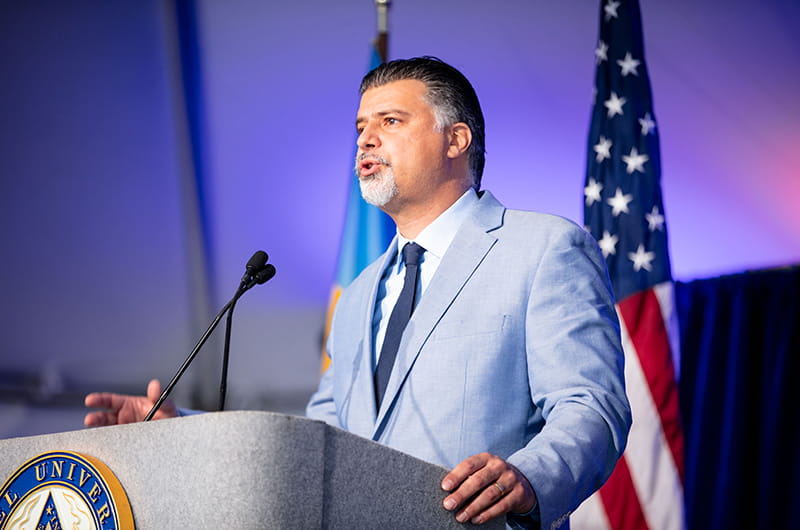
For Montalto, who is also a leader in Drexel’s 2021 Climate Year initiative and director of the North American Hub of the Urban Climate Change Research Network (UCCRN), now is also the time in which collaboration and shared expertise must also be undertaken to create actionable change. Through Climate Year, Drexel is striving to become a more sustainable University both on campus and through its reach in the community, city, and world. Montalto spoke to the power of faculty incorporating more climate change-related scholarship and research into the classroom to better prepare tomorrow’s leaders.
“Climate change is amplifying the social, ecological, economic infrastructural and health challenges that you already know,” said Montalto. “Let’s complement our teaching of classical theory in these areas with immersive learning experience and applied research activities that will force us and our students to confront both the constraints and the opportunities that lie between us and a much more sustainable, resilient and equitable form of development.”
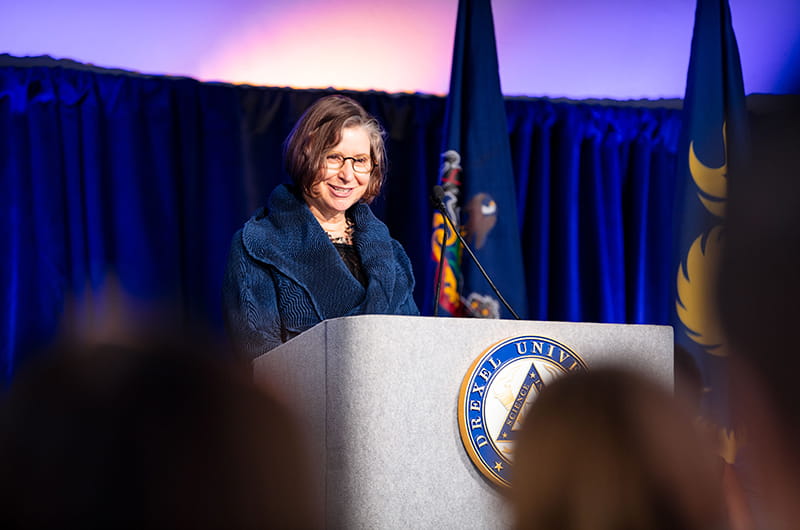
The importance of looking to the future was also something that Dion, a design scientist conducting transdisciplinary research on functional fabrics, spoke of in her keynote address. By finding inspiration — at the “Extreme Textiles: Designing for High Performance” exhibition at the Cooper Hewitt Museum — to make change in the textile and design industry as part of her own academic career, Dion discussed the importance of using and learning fundamental techniques to develop technological innovations and move both industries, disciplines and everyday life into a better place.
“Our work often involves uncovering more challenges than solutions at the beginning and building our tools to realize our vision,” said Dion. “Successful projects depend on complimentary expertise, and many collaborations take years to establish great collaborators, respect each other’s processes and in turn enable discoveries at the edge of discipline.”
The two student speakers at this year’s Convocation, who, like all Drexel students, are continuing their education at Drexel to contribute to tomorrow’s changing world, discussed the importance of building community in their respective speeches.
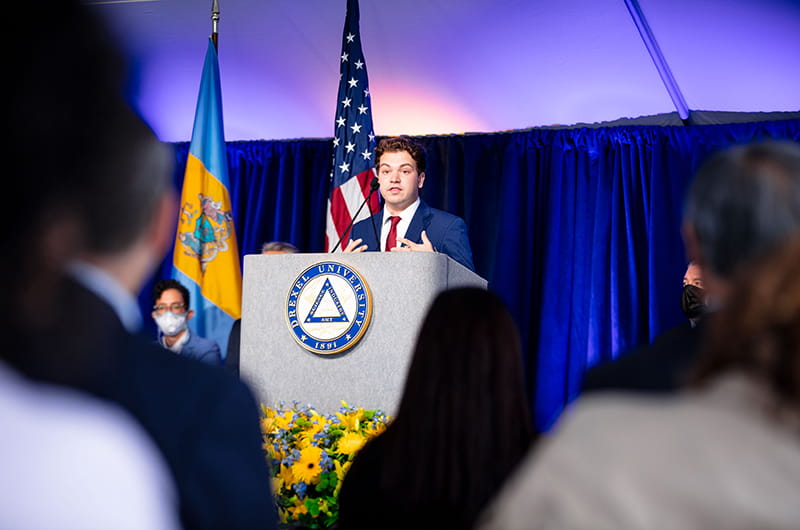
Undergraduate Student Government Association (USGA) President Jarod Watson, a fourth-year entertainment & arts management student, highlighted how the student body and student groups, while working with Drexel’s administration, are working to “drive change to create a Drexel that we all believe in.” As Watson noted, a conversation with a friend about increasing student participation in elections sparked a change that, after many conversations and collaborations over time, led to Drexel closing early on Election Day last year to give Dragons more time to vote.
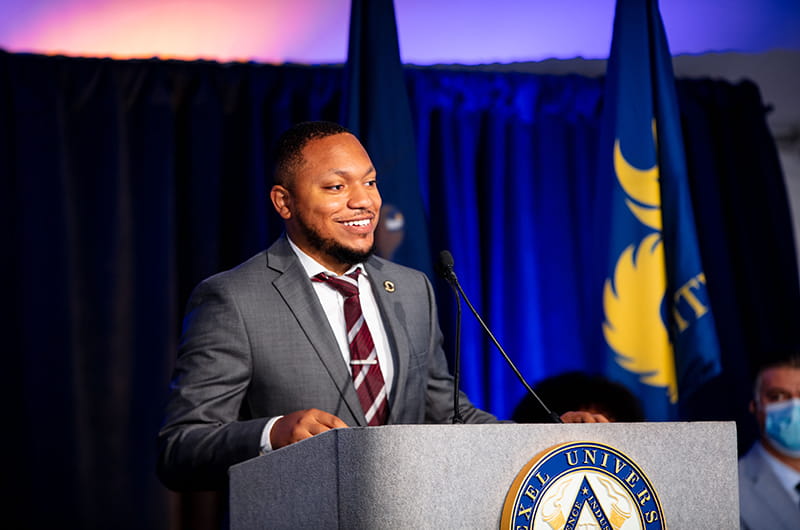
“Growing up, my mom would always tell me to be the change that you want to see in the world, and it took me a really long time to recognize that change is not some monumental, unreachable concept,” said Watson. “Through serving the student government for four years, I have seen small moments of action and service blossom into something much larger: meaningful change and real community impact.”
Matthew Shirley, a PhD candidate in biomedical engineering and president of the Drexel Black Graduate Student Union, urged Convocation attendees — especially students and graduate students — to seek out the “various systems in place to support you,” and find community and mentorship on campus.
“The University cannot prosper without success of its students and by default, the Graduate College cannot prosper without it of the graduate students,” said Shirley. “As a means of improving the direct experience for every student, Drexel recently released the Anti-Racism Task Force’s final report, a report a year in the making putting forth an actionable commitment by Drexel to alter the culture and climate of the University in order to confront systemic inequities and injustices. I encourage you all to read it, discuss it and not only become active participants in its vision, but practice accountability with the systems in place here at this institution.”
To finish Convocation on a timely note, Kevin Owens, PhD, associate professor of chemistry in the College of Arts and Sciences and chair of the Faculty Senate, shared a story he learned while listening to a Radio Lab podcast about Maurice Hilleman, a Merck vaccinologist whose work on vaccines saves millions of lives a year.
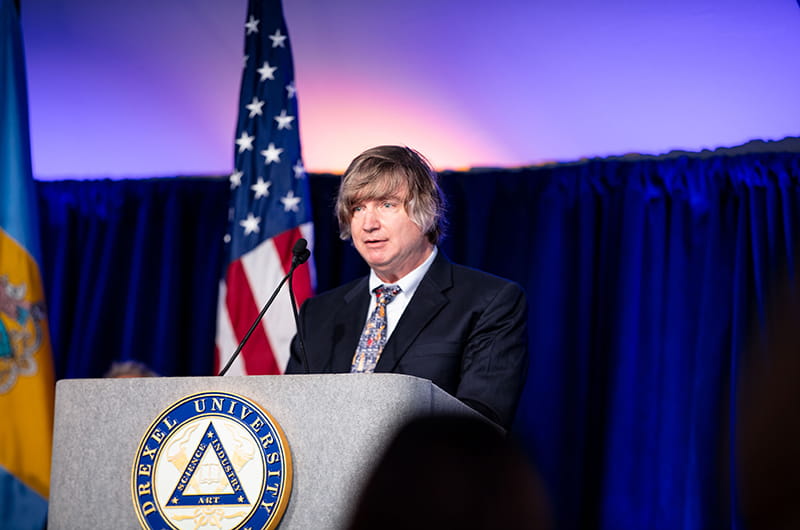
“Over his long career, he and his team developed over 40 vaccines, including eight of the 14 vaccines we all get as children, including measles, mumps, Hepatitis A, Hepitatis B and chicken pox. He carried around a list in his pocket of diseases that needed to be conquered. Yet even with all of this success, he was an incredibly humble person,” said Owens. “In an interview shortly before he died, Hilleman pondered, ‘Looking back on one’s life, you can say, ‘Gee, what have I done? Have I done enough for the world to justify having been here?’ When he died in 2005, Paul Offit, from Children’s Hospital of Philadelphia was giving a talk at the University of Pittsburgh to a group of 35 pediatricians, and he announced the news of Hilleman's death. None of the pediatricians present recognized Hilleman's name, but that doesn't make his work any less important. I applaud my faculty colleagues. Your work inspires me. I’m humbled to work here at Drexel with you. You have certainly done enough to justify being here.”
This moment in time, both at Drexel and in the world, shows that connectivity and compassion have been so greatly needed and shared, especially now that the University has welcomed back its students, faculty and professional staff on campus.
Drexel News is produced by
University Marketing and Communications.
